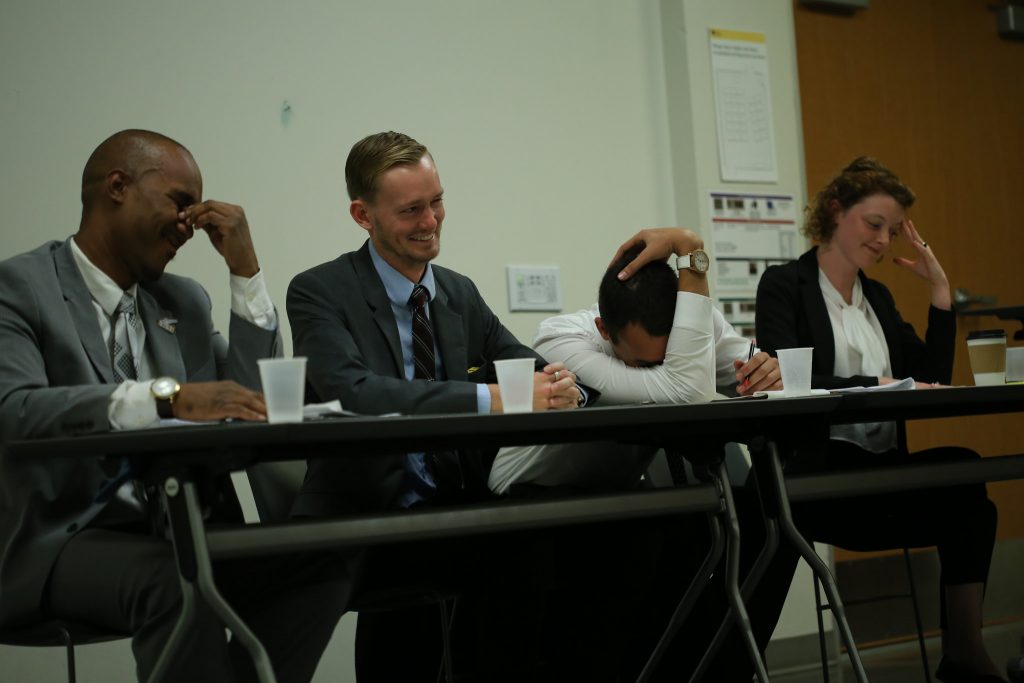The Political Science Student Association questioned the two-party system during a debate at SF State Oct. 29.

Christopher Larson, an urban studies and political science double major, and Michael Lin, a political science instructor, discussed whether significant change was possible in the two-party electoral system. The debate was moderated by Baelaya Berendsen, the vice president of PSSA.
The two-party electoral system exists when two major political parties dominate government. One party typically holds a majority of the government body and is referred to as the majority party, while the other is regarded at the minority party. The United States has a two party system, with Democrats and Republicans forming the two major parties.
In the debate, Larson took the stance of supporting the two-party system, which he said despite not being perfect, has not failed the United States. He read a quote from John F. Kennedy to demonstrate that even during his presidency when public opinion was better, people still questioned the system of government. Larson cited the many ups and downs with the two party system throughout the years, but stressed that there have been major successes.
“The two-party system has flaws, but is the closest thing to a perfect system as we’ve figured out how to make,” Larson said.
Larson said the problem is not the two-part system itself, but instead people’s inability to work with the framework of the system. Additional parties have come around, but can never contend with two major parties, according to Larson. Larson invited Lin to come up with an alternative to the two party system, but warned that if any change were made the costs would outweigh the benefits.
“The system has been more or less a two party system since 1854, and has been relatively very successful at addressing its own shortcomings,” Larson said in an email. “Huge changes have swept through our country, sometimes events that would have destroyed weaker political systems, but the existing system has outlasted those changes by slowly and deliberately modifying itself to suit contemporary needs.”
Lin challenged the two-party system with the argument that government was created to control people and prevent them from breaking out of the mold. People with the most money create this mold, because they finance presidents and other political leaders, according to Lin.

“The founding fathers, like Madison, represented the most elite interest at the time during the constitutional convention in 1787,” Lin said. “These were the most powerful and the most wealthy men at the time and they endeavored to construct a government that would protect their interest, a stronger government that would protect their private property.”
The abolishment of slavery, women securing the right to vote and the civil rights movement were just a few of the successes the two-party system is responsible for, Larson said. In rebuttal, Lin contended that social justice is responsible for real change in America, not the two-party system. Although Occupy Wall-street and other social justice movements have come and go, they have brought consciousness to society, according to Lin.
“Change will not come from the two-party system,” Lin said. “Change will not come from the top. Change, at least for the majority, will come from the grass roots level.”
Despite conflicting views on the two party system, Larson and Lin both said they agree that SF State students should care about what is going on in the government because of the tremendous affect it has on them. Debates like the one organized by the PSSA, are important to have on a college campus in order to facilitate student and faculty’s discussion current events, Lin said.
“Students are historically some of the most influential activists, and contribute to how the country continues to evolve,” Larson said. “It is important to stay educated to guide not only the country, but the world to a more utopian future.”
Despite low turn out, the approximately 15 students in attendance showed significant interest in the debate, participating in the open questions portion.
“We hope to make this an opportunity to learn and engage in critical debate about the system as a whole,” said PSSA President Simone Radliff said. “It’s important to be knowledgeable about our government because we are the future.








didyoujustgrabmyass • Nov 5, 2015 at 9:36 am
Great job!